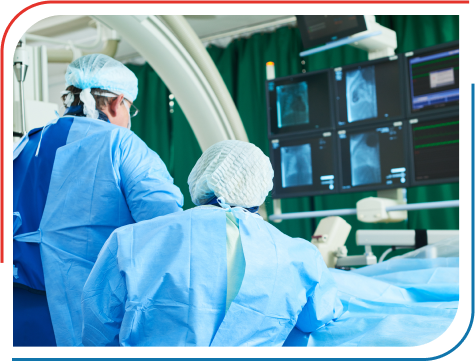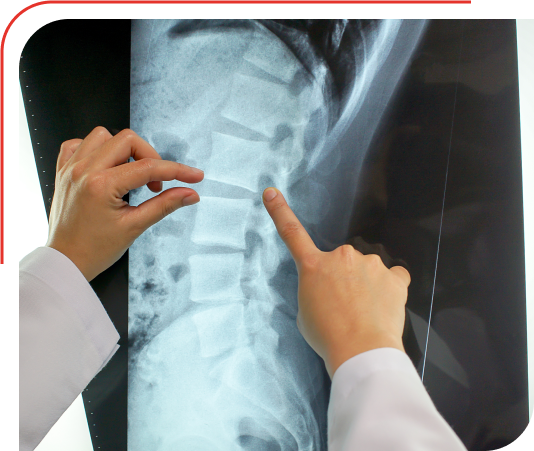Home » Medical Procedure » Interventional Radiology
Interventional Radiology
Procedure

Why Choose Wockhardt Hospitals
For Interventional Radiology Procedures?
Wockhardt Hospitals is the most reputed hospital that offers the facility of Interventional radiology in India. The hospital’s trained radiologists use minimally interventional radiology procedures to diagnose and treat the human organ system. Some various diagnostic tests and procedures they perform include CT scans, fluoroscopy, MRI, biopsies, etc. Also, Wockhardt Hospitals use the latest machines to carry out interventional radiology treatment procedures. The hospital provides the option of speaking with radiologists and booking an appointment through their website. This allows patients to have one-on-one conversations with the doctors. The hospital’s trained staff delivers comprehensive care to the patients throughout their treatment procedure. Wockhardt Hospitals interventional radiology departments offer top-notch interventional radiology services and deliver the best results to its patients.
Renowned Radiologists
at Wockhardt Hospitals
- Mumbai Central
- Mira Road
- Nagpur
- Rajkot
What is Interventional Radiology?
Interventional radiology (IR) is a subspecialty of Radiology. There are two types of Interventional Radiology. These are diagnostic and therapeutic interventional radiology. Doctors specialising in this field are known as interventional radiologists. In IR, radiologists diagnose patients with the help of imaging tests and perform less invasive procedures to cure their conditions. Diagnostic tests performed by radiologists are X-rays, MRI, CT scans, ultrasound and fluoroscopy. Interventional radiologists interpret these images and then suggest treatment options.
Radiologists conduct various treatment procedures, including inserting stents, biopsies, treating tumours, inserting catheters, etc. This reduces the need for older treatment procedures. In addition, interventional radiology reduces pain, cost, risk and recovery time for patients. Due to these reasons, it has become the primary option for treating various kinds of conditions.
Types of
Interventional Radiology
Interventional radiology comprises multiple diagnostic and treatment procedures. It is broadly classified into:
- Diagnostic Interventional Radiology - Diagnostic IR is used to examine the abnormalities in the body. In this, various imaging tests are performed to determine the functional and structural abnormalities in the organs. Some of these tests are:
- CT (computed tomography) scan - In this, X-rays are used to take images of your body.
- MRI (magnetic resonance imaging) - Radio and magnetic waves take images of the body.
- X-rays - These rays can detect fractures and other conditions.
- Ultrasound - This test uses high-frequency sound waves to examine the abnormalities.
- Angiography - In this, catheters are used to take images of blood vessels.
- Therapeutic interventional radiology - It is also known as radiation therapy. This type of IR consists of different types of minimally invasive surgical procedures. Some of these processes include embolisation, chemoembolization, gastrostomy, etc.
What are the Benefits of
Interventional Radiology?
Some top benefits of interventional radiology treatment are:
- It can treat a wide range of conditions, including back pain, lung tumours, ureteric blocks, hypertension, etc.
- IR can be performed with other treatment options, like chemotherapy.
- It reduces complications or risks.
- Compared to older treatment procedures, it offers faster recovery time.
- IR also provides patients with outpatient treatment procedures.
- As IR offers outpatient treatment options, it lowers treatment costs for the patients.
What Procedures Do
Interventional Radiologists Perform?
Below are some major interventional radiology treatment procedures performed by Radiologists:
- Angioplasty - This interventional procedure is used for treating blocked or narrowed coronary arteries. During this procedure, the surgeon inserts a balloon-tipped catheter into the blood vessel. Then, he inflates the balloon to open the blockage in the vessel.
- Embolisation - This interventional radiology procedure is used to block blood vessels. To do this, radiologists put embolic agents such as gelatin beads via catheter into the blood vessel.
- Chemoemobolisation - It is also known as transarterial chemoemobolisation (TACE). In this interventional procedure, the blood supply to the tumour is blocked. This is done by injecting anticancer drugs into the blood vessels through the catheter.
- Stent placement - In this interventional procedure, surgeons use a stent inside a blood vessel at a blockage point. The stent is expanded to keep the blood vessel open.
- Uterine fibroid embolisation - With the help of fluoroscopy, the catheter is inserted in the uterine artery via the wrist artery by making an incision. The catheter injects embolic agents to stop the blood flow to the fibroids. The procedure is done on both the left and right uterine arteries.
- Radiofrequency ablation - In this procedure, an imaging technique is used to insert a probe via the catheter. The imaging technique generates radio waves which produce heat and kill cancer cells.
- TIPSS - It is the acronym for a transjugular intrahepatic portosystemic shunt. During this medical process, the imaging technique guides the radiologist to insert a stent. This stent connects the hepatic and lower veins and treats the diseased liver by stopping the bleeding.
- Percutaneous nephrectomy (PCN) - This interventional procedure treats patients having blockages in the urinary system. In this process, the catheter is inserted into the kidney to temporarily drain out urine.
Who Gets
Interventional Radiology Treatment?
Interventional radiology is not just for cancer patients. It can treat a large number of medical conditions. Patients having the following health problems are required to undergo interventional radiology treatment:

- Claudication and rest pain
- Back pain
- Malnutrition
- Obstruction
- GI bleeds
- Ureteric blocks and bile duct
- Benign prostatic hyperplasia
- Ischaemic diabetic foot
- BPH (Benign prostatic hyperplasia)
- Gastrointestinal bleeding and ischemia
- Liver cancer
- Biliary obstruction and leak
- DVT (deep vein thrombosis)
- Peripheral arterial disease
- Venous and lymphatic malformations
What Happens During
an Interventional Radiology (IR) Procedure?
What happens during
an Interventional Radiology (IR) procedure?
In an interventional radiology procedure, radiologists diagnose and treat the condition. The type and time of the procedure will depend on the patient’s condition.
During an IR procedure, a radiologist uses medical imaging to perform the surgical procedure. This imaging test can be an MRI, CT scan, fluoroscopy or ultrasound. The surgeon then makes incisions in your abdomen region to put catheters or needles. While performing the procedure, the radiologist looks at the medical images on the screen to guide the surgical tools through your organs, arteries and blood vessels. The IR procedure is performed under local anaesthesia. It will only take less than four hours for the procedure to complete. After the procedure, you will be admitted to the recovery room, where you will be monitored around the clock. You will also be asked for a follow-up after you get discharged.
Radiology Care Blogs
FAQs on Interventional Radiology
Q. What is the most common procedure in interventional radiology?
Angiography is the most commonly performed procedure in interventional radiology. It involves using imaging methods to examine blood arteries and diagnose or treat disorders such as aneurysms, arterial blockages, or vascular abnormalities. Angiography is a keystone of many treatments in this discipline, frequently acting as a foundation for other operations such as angioplasty, stent implantation, embolization, and thrombolysis.
Q. What is the recovery time for interventional radiology?
Depending on the complexities of the intervention and the patient’s general condition, the recovery period for interventional radiology processes is usually shorter than that of standard surgery, lasting anywhere from a few hours to several days. Patients must adhere to the post-procedure advice given by their medical providers since individual recovery experiences may differ.
Q. What are the challenges of interventional radiology?
One of the challenges in interventional radiology is the constant requirement for equipment and imaging technology developments to improve procedural safety and accuracy. Furthermore, traveling through complex blood veins or reaching specific anatomical locations might be challenging, necessitating considerable training and expertise from the interventional radiologist.
Q. Is interventional radiology a minimal procedure?
Yes, interventional radiology is mainly a minimally invasive method that uses natural body openings or tiny incisions to access and treat various medical issues. This method requires fewer major surgical procedures, which results in shorter recovery periods, fewer problems, and better patient outcomes.
Q. Is Interventional Radiology right for me?
Interventional radiology treats various medical conditions. It is a minimally invasive procedure that offers lower risks, pain and costs. IR is preferred over older surgical procedures. Hence, it can be the right option for you. You can consult a radiologist to learn more about your condition and the IR procedure.



















